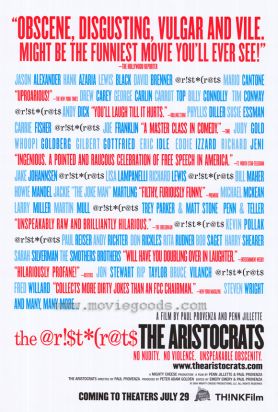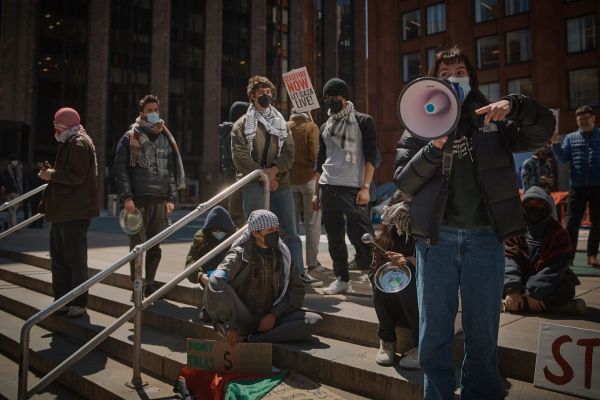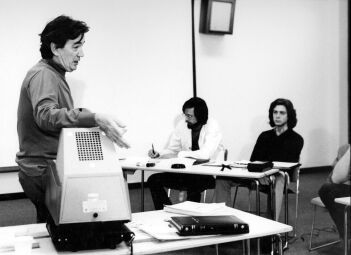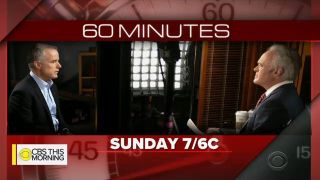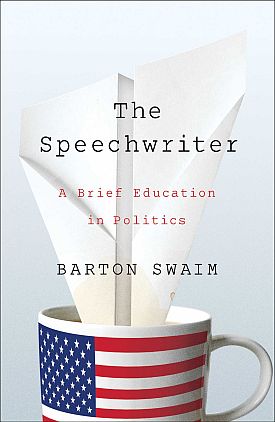Talking Dirty
From The American Spectator“Ladies and children not admitted.”
Readers of Mark Twain’s Huckleberry Finn will remember that that was the final line, in the biggest type, on the handbill for a performance of The King’s Camelopard or The Royal Nonesuch in the town of Brickville, Arkansas. The man calling himself the Duke of Bridgewater, who printed it up, had said: “There. If that line don’t fetch them, I don’t know Arkansas.” And it did fetch them, as it always has done. Even in the permissive world of today, where “ladies” have been admitted into the full fellowship of what are still sometimes called “dirty” books, movies and theatrical exhibitions, the ratings systems for movies and television designed to protect children can also give them the thrill of looking into — well, if not the forbidden at least the discouraged.
The latest to try the trick is The Aristocrats. Directed by Paul Provenza and produced by Penn Jillette of Penn and Teller, it consists of little apart from successive iterations of the same dirty joke by a Who’s Who of English-language comedic talent. The hook is a contemporary equivalent of the Duke’s “Ladies and Children not admitted.” The film is being released without a rating, but every bit of publicity about it — including the review you are reading — assures us that it can tell the joke’s set-up and punch-line and no more.
A man walks into the office of a theatrical agent to sell him an act. It’s a family act, consisting of himself and his wife, their son and daughter and a little dog.
“What do they do?” asks the agent.
The man then proceeds to describe in graphic detail a series of ever more disgusting acts of scatalogical abandon and sexual perversion. Legend among comedians has it that the record for stretching it out is 90 minutes.
Finally, the description is over and the agent says: “That’s quite an act. What do you call yourselves?”
The man answers: “The Aristocrats.”
It’s actually not a very funny joke, as several of the tellers in the film admit. But to a comedian it is what Shakespeare’s sonnets are to a poet, namely the purest expression of his craft — because both the sonnets and the joke are all form with a minimum of distraction from the content. The comparison in the film is with jazz: the melody is nothing, the improvisation everything. Or, as Mr Jillette puts it: “It’s the singer, not the song.” You could almost say that the joke is better because you don’t have to laugh at it. The only time in the film when I laughed out loud was at Wendy Liebman’s very clever reversal of its premiss, where the body of the joke is pristine and all the obscenity is transferred to the punchline.
But as someone else observes, it’s also dear to the hearts of funnymen because “it’s a joke about the sweet old days of show business” — the days when no comedian in his right mind would dream of telling it before an audience and it could only be told to other comedians, “after the headmaster went home.” In short, back in the days of the burlesque show and the stag film and the smoker — the days of “Ladies and children not admitted.”
The Russian literary theorist, Mikhail Bakhtin (1895-1975) in his study Rabelais and His World distinguished between what he called the Official and Unofficial Cultures of the medieval and early modern periods. The Official Culture was that of morality, discipline, sacrifice and earnestness, the Unofficial that of immorality, self-indulgence, cowardice and laughter. The first produced epic, tragedy and the higher forms of romance. The second produced the low comedy of the farce and the fabliau. In Freudian terms, the Official Culture was the superego, the Unofficial the id. The relation between the two, said Bakhtin, was “dialogic.” That means that — also like the superego and the id — to some extent they depend on each other. Certainly, neither makes very much sense in artistic terms without the other.
Rules, as they say, were made to be broken, and so were taboos. Yet the converse of that truism is that the pleasure of breaking taboos is directly proportional to the strength of the taboo in the first place. Without a strong and culturally potent moralism, immoralism becomes merely insipid. That’s why, though the comedians in The Aristocrats never quite admit it, they are really longing for those good old days before the collapse of the Official Culture in the 1960s when they could still be dangerous outlaws like Lenny Bruce — or at least could offer the audience what that other aristocrat, the Duke of Bridgewater, did, namely the excitement of descending into a licensed pit of sin and wickedness. Compared with this, the publicity material’s stress on the fact that only the set-up and the punchline can appear in a “family” publication like this one is pretty tame stuff. Nobody has to go far to get off the reservation these days.
Similarly, Michael Winterbottom’s 9 Songs, which opened recently, was according to its publicists the first film not made as pornography to show certain sexual acts. There’s a come-on to quicken the pulse! Yet most people will wonder exactly what remains to distinguish it from pornography if it shows those acts. For both films, the publicity is designed to strike a spark of danger and excitement from the now-cold ashes of the conflagration that, in the 1950s and 1960s, destroyed so many of our cultural taboos and nearly all of those relating to sex. It’s not an easy thing to do.
One or two of the interviewees in The Aristocrats toy with the idea of reintroducing some shock value into the joke by violating not the old, discarded taboos but those of the new Official Culture which has been cobbled together out of political correctness and the late 20th century obsession with health and safety. The new taboos are being offensive to women, minorities or anyone who can claim to be ill or disabled, violating childish innocence and smoking. But the film doesn’t go very far down this road. One of its most interesting moments comes with Sarah Silverman’s monologue in the persona of the daughter in the vaudeville act as she realizes for the first time that she has been raped. I guess it is meant to be funny in a disturbing kind of way. Likewise, both Andy Richter and Doug Stanhope tell the joke to little babies. If the kids had been a year or two older no one would have thought this funny.
Hollywood has always played around with taboos while being squeamish about actually breaking them. Billy-Bob Thornton’s character in Bad News Bears, another movie that opened recently, violates the new taboos by smoking, drinking and cursing around the Little Leaguers he coaches and endangering their health and safety by exploiting their labor in his exterminating business. Yet in the end we are meant to see the gung-ho attitude of the winning coach, played by Greg Kinnear, as being much more disreputable. After his own brief flirtation with the Vince Lombardi style of coaching, Billy-Bob reverts to his former laissez-faire approach and ends up in the same camp as the new Official Culture, which holds that the point of Little League is not to win but to have fun. I guess we are meant just to forget his earlier irresponsibility. Throughout its history, the movie business in America has gone through periods when it has liked to think of itself as being daring and “transgressive,” but all three of these films remind us that actually being daring and transgressive is a whole different kettle of sick.
Discover more from James Bowman
Subscribe to get the latest posts to your email.

